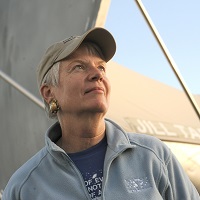Jill Tarter - 2019 SPIE Women in Optics Planner
Emeritus Chair for SETI Research
SETI Institute, USA
 |
Country of Birth: USA
|
I decided to be an engineer during a discussion with my dad when I was eight. He died a few years later and I managed my engineering classes because I was determined to make him proud of me. Later I found the problems of how stars are born and die to be more interesting, so I switched to the study of astronomy in graduate school. My engineering studies gave me very good problem-solving skills, I just sought more interesting problems.
I am retired, but for decades I was the director of the Center for SETI Research at the SETI Institute, a nonprofit organization I co-founded in 1984. The Institute’s mission is to explore, understand, and explain the origin and nature of life in the universe, and to apply the knowledge gained to inspire and guide present and future generations. Many of my colleagues search for evidence of microbial life beyond Earth. My team used radio and optical telescopes to see if we could detect evidence of distant technologies that would tell us about intelligent life in the cosmos.
It was hard being an isolated female during my undergraduate years. I worked hard, made good friends with some of my male student colleagues, and joined a sorority of women to feel less lonely. I had more female colleagues when I became an astronomer, and I thoroughly loved the opportunity to try to answer one of humanity’s oldest questions, “Are we alone?”
I wish someone had advised me to become part of a team as a student. Teamwork is very important in almost every part of science and engineering today, and it takes practice to be a good team member, and then a team leader. Start building your team working skills early.
It is an amazing way to live your professional life—try to find answers to questions that interest you, maybe create something that never existed before, and find new ways to use things that others create. STEM fields are international by nature, and there are opportunities to travel, learn, and work with teammates from around the world.